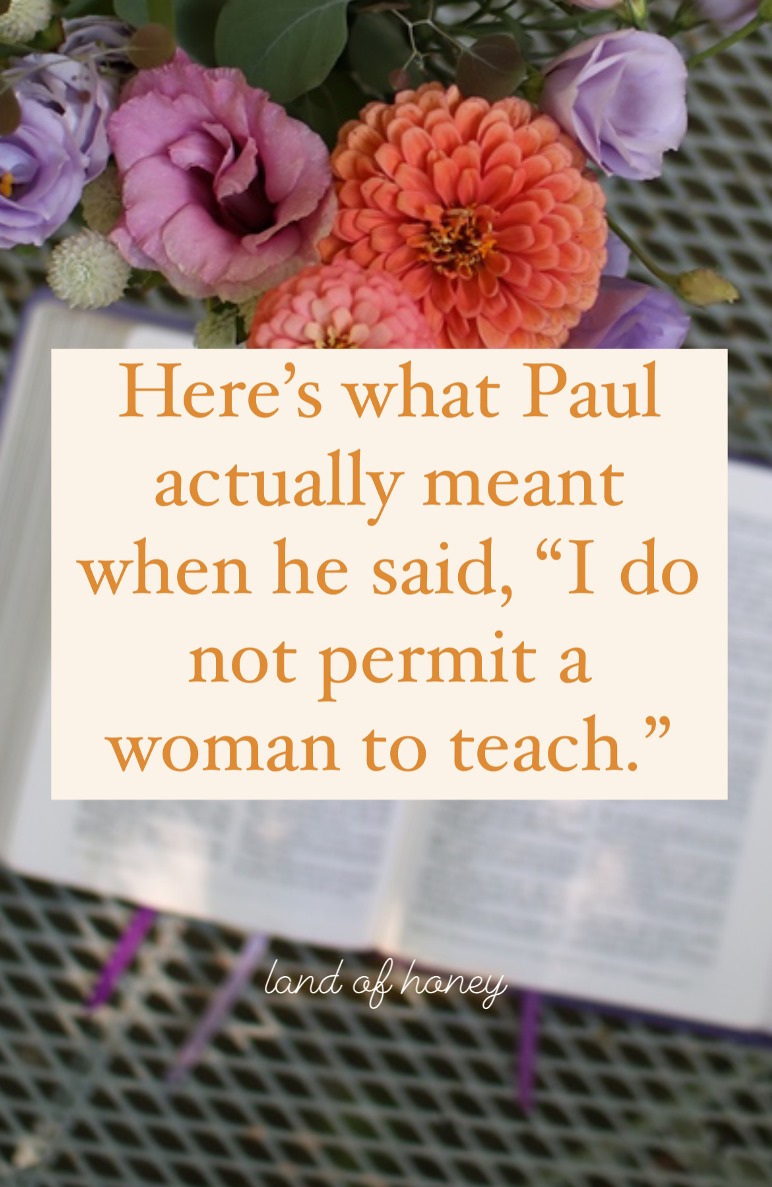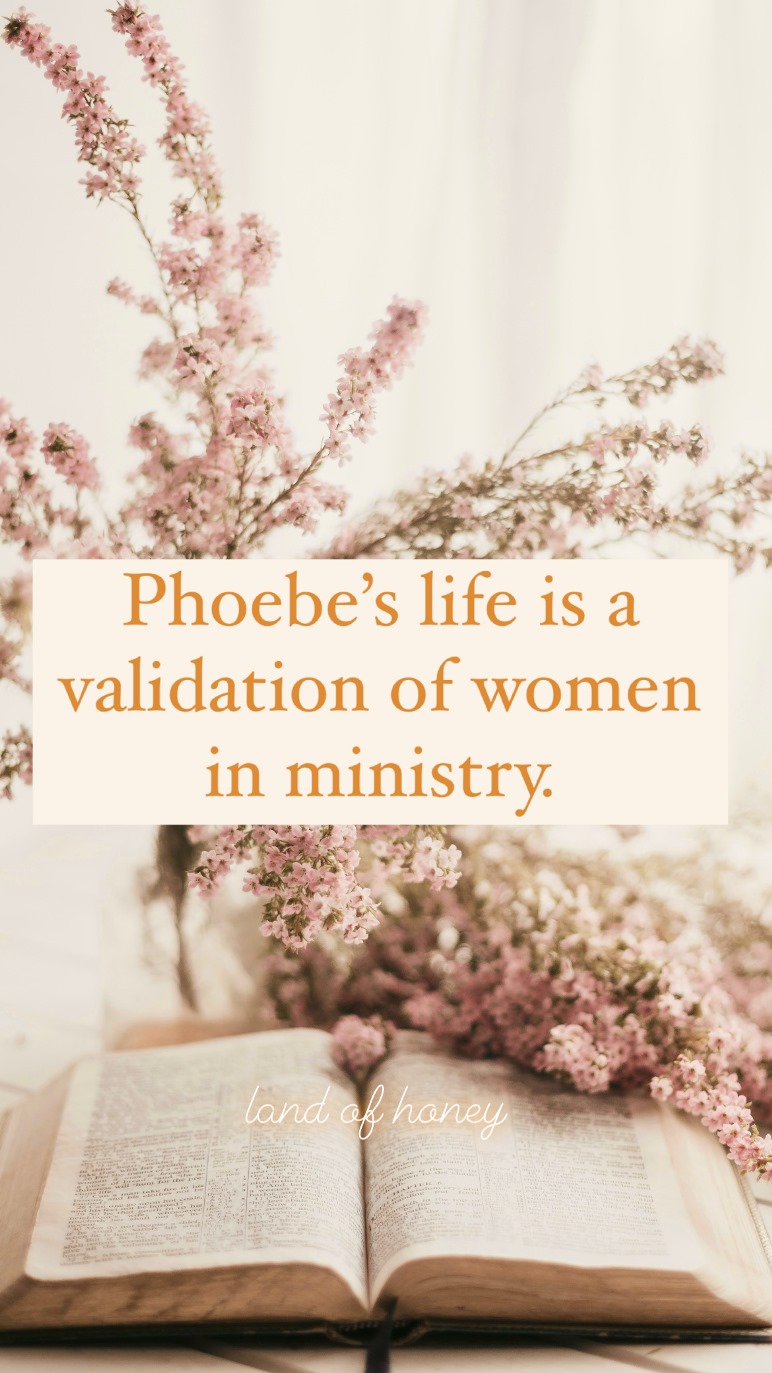What did Paul mean by "I do not permit a woman to teach"? This verse from 1 Timothy 2:12 that seemingly forbids women from teaching or preaching or 'having authority over a man' has long been used to ban women from ministry or even speaking about Biblical truth in many contexts. While most Christian denominations have taken these infamous words at their English face-value, if we study the words used and the rest of Scripture we will be able to see that this was not a universal ban on women teaching, and that Jesus and Paul both treated women with respect and dignity, and not like the lesser beings that many today believe.
Let's take a look at how this New Testament passage typically reads in English Bibles:
"A woman should learn in quietness and full submission. I do not permit a woman to teach or to assume authority over a man; she must be quiet. For Adam was formed first, then Eve. And Adam was not the one deceived; it was the woman who was deceived and became a sinner." -1 Timothy 2:11-14
It's easy to quickly read over those sentences from the NIV Bible and think that Paul is not permitting any woman, ever, to teach. Many denominations teach that because Eve was the one that was deceived it means that all women are gullible and easily deceived. Therefore, they cannot be trusted with teaching or exercising any kind of authority.
Here we have the myth: women aren't allowed to teach. Period.
This one belief has held back millions of women from teaching the Gospel, and has brought a barrage of rude remarks and abuse on most women who do teach Scripture. But of course, the way denominations apply this supposed teaching of Paul is plainly at odds against what they believe he said. If women are so easily deceived that not a single one is fit to teach anything related to the Bible...then why is it okay for women to teach children or other women? Most people will point to "assume authority over a man," and make an assumption that Paul is saying that women just can't teach men. But, if the reason they can't teach is because women are gullible or easily deceived...why would they be allowed to teach women and children? Would that not be an incredibly terrible way to run things...to have deceived people teaching wrong ideas to children and then expect the children to grow up and understand faith and God's word? Would any denomination recognize that a teacher is deceived and then decide that they are fit to teach children and women?
However there is no caveat here that it's fine for women to teach children, their own or otherwise, or other women. Most people who teach this myth were taught the majority of what they know about God's word in children's Sunday school - and nearly all Sunday school teachers are women. I also frequently hear from women who attempt to teach me that women aren't allowed to teach...an irony so heavy that it's barely worth mentioning.
But you know what? That is not what Paul's getting at.
First of all, Paul frequently mentions women who are teachers and leaders in the early church movement, and he does so positively. Of all the people Paul offers greetings to at the end of the book of Romans, he only commends Phoebe, calling her a deacon and a leader (Romans 16:1). And he tells the people he's writing to, to support her. Most scholars believe that by listing her first, Paul is indicating that she is the one bearing his letter. That means that one of the most significant books in the New Testament was originally entrusted to a woman...which means once the letter was read, any questions about it would be directed towards Phoebe, who would then explain or elaborate on the meaning of Paul's words. Another word for explaining something would be teaching.
The second person he mentions in Romans is another woman, Priscilla. He calls her and her husband, Aquila, his coworkers in the Messiah. In Romans 16:12, he mentions three more women who work in YHWH, Tryphena, Tryphosa, and Persis. In 1 Corinthians he encourages all believers to prophesy and speak in tongues...including women. Paul also points out in 1 Corinthians 7:3-5 that men and women have equal rights in the marriage.
We have covered elsewhere that the notorious, "Let women be silent, they are not allowed to speak," passage of 1 Corinthians 14:34 was Paul quoting someone else's incorrect quotation of Biblical law.
In light of Paul being supportive of women like Phoebe in leadership roles in the church, it simply does not make sense that he would simultaneously ban all women from teaching. We see that he put Phoebe in a position of teaching his letter to the Romans. This sudden ban also doesn't fit with the Old Testament, where we see women like Deborah, Miriam, and Huldah in leadership roles. Contrary to popular belief, the Old Testament never says that women can't teach or lead.
So what is going on in 1 Timothy 2:11?
We should note that Paul's letter is composed in response to questions and concerns that Timothy was dealing with at the time. This means he wasn't compiling a list of life advice or helpful hints to pastoring, but is referencing specific situations and events that Timothy was dealing with.
If you study the New Testament, you're probably aware that ancient Greek doesn't have grammar in the sense that we are used to in English. The word that is mostly translated as "a woman" is just one word - gyne (Strong's G1135). Which does mean a woman, but it means a certain or specific woman. It does not mean all women. The significance of this is huge.
This changes the meaning of this sentence from, "I do not permit any women to teach," to "I do not permit that specific woman to teach"!
The meaning of 1 Timothy 2:12: Paul does not permit a specific woman to teach.
Further support for this idea comes from the rest of the passage.
"...she must be quiet. For Adam was formed first, then Eve. And Adam was not the one deceived; it was the woman who was deceived and became a sinner."
Many Christian denominations will tell you that because God made Adam before Eve, then the men of the world are entitled to do all the teaching and hold all the leadership positions, and women are forbidden from all ministry opportunities. But Scripture never says that Adam was superior because he was made first. Mind you, Adam was the second-to-last part of creation...are pigs and insects and fish superior to Adam because they were made before him? John and Stasi Eldredge teach in their book Captivating that woman being formed after Adam wasn't an insult or a sign of a lesser status, but that she was formed last as a fitting climax to the Creation story itself.
And if being made first is the issue here, wouldn't that mean that the pastor of every church should be the oldest person there? Should there be a ban on learning anything from someone who is younger than we are?
But why does Paul bring up that Adam was formed first? Well, if he's talking about a specific woman that Timothy is having trouble with, he's bringing it up because it ties in with the issue that he was addressing.
What many scholars believe was happening was that a certain woman in Timothy's congregation was teaching that Eve was formed first and that Adam was the one that was deceived. This information is incorrect based on the book of Genesis. So Paul was saying that he was not permitting this specific woman to teach, because what she was teaching went against the basics of what the Bible teaches.
This is a perfectly sensible approach to what was a bad situation for Timothy's community, and that's what I would want from any church or ministry...that they wouldn't allow any person - female or male - to preach incorrect information about Scripture, to anyone.
If we look at the passage in this light, where Paul is not placing a universal ban on all women teaching for all time, that makes sense with how he does support certain women who teach, such as Phoebe and Priscilla. Paul is not banning women from teaching, he's banning bad teaching.
We should also note that Paul is not banning all women everywhere from having any kind of authority over males. He's saying that he does not endorse this specific woman having authority, because she was wrong about what the Bible says. We know that Paul is not against women exercising authority or being in leadership. As mentioned earlier, he told the people in Rome to listen to Phoebe and be supportive of her.
A better translation of 1 Timothy 2:12 would be:
"I do not permit that woman to teach, because she lacks understanding about basic issues like Adam and Eve being formed."
I hope by now we can see that the criteria that Paul valued when it came to teaching was correct knowledge and understanding of the word of God and the work of the Messiah. Qualification is not based on gender. God used both men and women to teach his word, tell of his glory, to serve as prophets and leaders in the Old Testament and the New Testament and he still does so today.
Related posts:
The Truth About 1 Corinthians 14 and 'Women Should Be Silent'
Who Was Phoebe in the Bible?
Mary and Martha - The Real Meaning of the Messiah's Words in Luke 10

.JPG)
.JPG)


.JPG)






